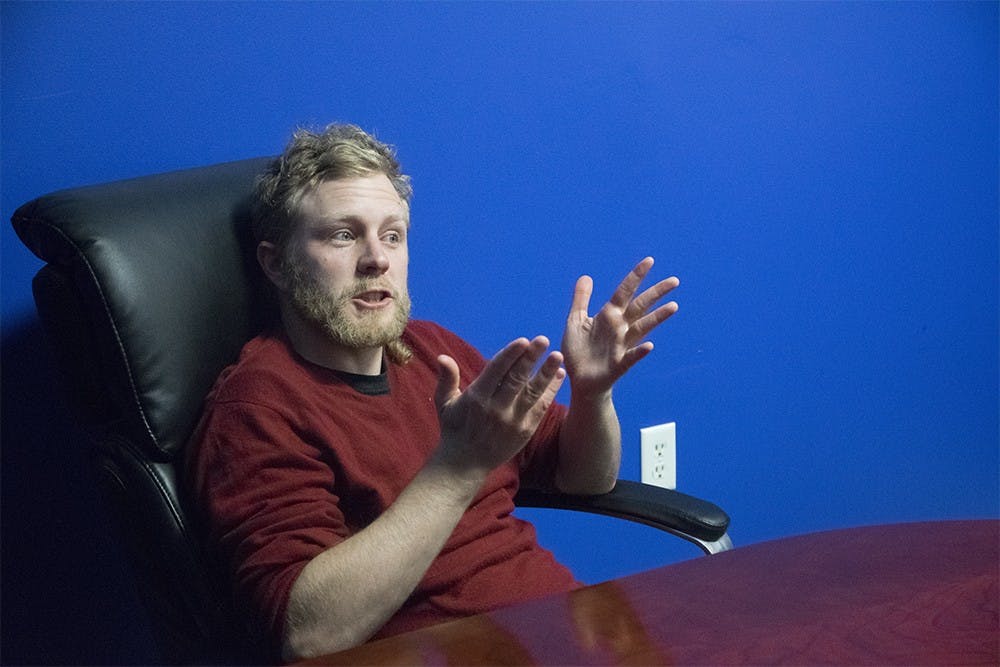The Bloomington Data Collective is looking to put Bloomington back on the technology map.
Chris Waggoner started the group in January to fill a gap he sees between the campus and IU’s professional community, and to bring the attention of the technology world back to town.
In the two-and-a-half months since its first meeting, the Data Collective has been host to speakers on hedge fund grants, corporate copyright infringement, startups and machine learning.
“The ultimate goal — and this is extremely grandiose — is to get people from Chicago, New York, L.A., all the places Bloomington people are always moving to,” Waggoner said. “To get them to look at Bloomington and say, ‘Wow, there’s some stuff going on there.’”
Waggoner, a freelance data scientist with Humility Consulting, said he’d become frustrated at having to work out of town to get paid well.
“I like living in Bloomington,” he said. “I don’t like people moving because of a lack of professional opportunity.”
The talks are uploaded to the Bloomington Data YouTube channel, where Waggoner said hopefully other interested parties will watch and trace the material back to Bloomington. Waggoner said speakers and attendees can participate in the meetings remotely as a way to direct attention from outside Bloomington to the work the Data Collective is doing in the city.
“We’re trying to direct attention onto us,” he said. “Pay attention here.”
Waggoner initially started the group with people he knew personally, then he started reaching out to potential speakers to draw in a larger crowd from outside his social circle.
“The shorter goal is just to entertain this core of people and bring in more like-minded people who are doing excellent work,” he said.
There’s a five-person core group who shows up consistently on alternating Wednesdays, he said, while speakers usually draw crowds of 25-35.
“The University people aren’t tuned in enough to business stuff for my taste,” he said. “People working around town can also benefit from these kinds of speakers and events.”
The first meeting, on Jan. 27, featured Zachary Dwiel of PlotWatt, a company that analyzes energy usage by appliance and then looks for ways to cut costs.
The Data Collective meets every other Wednesday at the Cowork on South Walnut Street, where Waggoner said he rents space, from 6 to 9 p.m.
He said the meetings are open, although that doesn’t mean every professional demographic will attend.
The speakers specialize in brand-new technologies, programming and apps, with which not everyone will be familiar, he said.
Waggoner, an IU graduate, said although he’s reached out to the University and heard some verbal interest, not many grad students have shown up on Wednesday nights.
Intimidation may be a factor in the low student involvement, he said, as the speakers are “high level” and require a knowledge of their fields and technological specializations beforehand.
Waggoner said he prefers speakers who are competitive and on the cutting edge in their fields, even if they seem less accessible to beginners.
“The people who come are saying, ‘Well, if it goes over my head, fine,’” he said. “‘I’d rather that than be talked down to.’”
The club is also, ideally, a space for people at high skill levels in similar fields to collaborate and improve each other’s projects.
Waggoner characterized the average Bloomington Data Collective participants as “people who have done work for companies you’ve probably heard of and are on the cutting edge of technology.”
“There’s a lot of talented people in Bloomington who don’t have a reason to come out of the woodwork and meet each other,” he said.
As a draw, though, Waggoner said “big data” is more a keyword to bring people in the door than a focus for him.
Instead of focusing on the undefined fields of “big data,” analytics and machine learning, Waggoner said he’d rather focus on practical uses for those skills.
“I think there’s a fickle demand for big data jobs and machine learning,” he said.
However, he said, those who are interested in big data because they think it’s the next big thing are generally hard-working, quality people who can benefit from the collaborative space.
As an overarching goal, Waggoner said he’d like to bring in people from less technology-heavy fields to see what new ideas could arise.
Over the summer, he’s bringing in speakers from Google and the Roman Institute of Mathematics, as well as Charlie Loyd of MapBox, a geologic mapping company.
He thinks a variety of niche interests could diversify the attendees and lead to more interesting collaborations.
“If you want to create something positive, how are you going to do it other than getting people to talk to each other?” he said.






